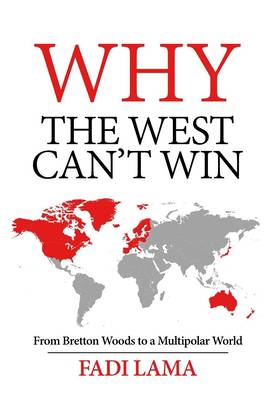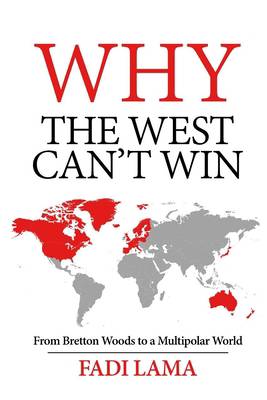
- Afhalen na 1 uur in een winkel met voorraad
- Gratis thuislevering in België vanaf € 30
- Ruim aanbod met 7 miljoen producten
- Afhalen na 1 uur in een winkel met voorraad
- Gratis thuislevering in België vanaf € 30
- Ruim aanbod met 7 miljoen producten
Zoeken
€ 40,45
+ 80 punten
Omschrijving
Why the West Can't Win: From Bretton Woods to a Multipolar World addresses how events in the three decades following the collapse of the Soviet Union in 1991 have led to a shake-up in the world's balance of power, signaling the end of a millennium of West European expansionism. Beginning with the war in Ukraine for regime change in Russia, events have proceeded at a blistering pace.
The West/NATO are losing the proxy war in Ukraine aimed at regime change in Russia. Even the mainstream media are now hinting that Ukraine may lose this war.
The West's shock and awe sanctions have failed, while damaging Western economies.
Dedollarization looms on the horizon. China, Russia, Brazil, India, ASEAN nations, Kenya, Saudi Arabia, and the UAE are now using local currencies in trade. Saudi Arabia is selling oil in yuan; UAE is selling gas in yuan. Ghana (and other oil-producing countries) are now selling oil in gold instead of dollars. France - the United States' oldest ally - is now trading with China in yuan. China and Brazil are now trading in each other's currencies India and Malaysia are currently using the Indian rupee for trade. The BRICS (the economic alliance of Brazil, Russia, India, China, and South Africa) is developing its own currency.
The geopolitical shift has been breathtaking, with the BRICS nations -- Brazil, Russia, India, China, South Africa -- setting themselves up as an alternative to existing international financial and political forums. Who is coming on board? Saudi Arabia, United Arab Emirates, Egypt, Algeria, Argentina, Mexico and Nigeria. So far.
This book's geopolitical analysis includes a historical overview, an understanding of the financial systems established at the Bretton Woods conference that continue dominating the global economy, how they are used as a powerful geopolitical instrument, an economic analysis based on real goods production, global energy dynamics, alliances and strategies of key global players. The current global geopolitical clash is in essence a struggle between the colonial powers wishing to preserve the Bretton Woods system that allows siphoning wealth of nations, and sovereign nations striving for independence and an end to a millennium of oppression. This work compares the geopolitical forces since the turn of the millennium with a view to providing insight into their relative strengths and the likely outcome of this struggle.
The West/NATO are losing the proxy war in Ukraine aimed at regime change in Russia. Even the mainstream media are now hinting that Ukraine may lose this war.
The West's shock and awe sanctions have failed, while damaging Western economies.
Dedollarization looms on the horizon. China, Russia, Brazil, India, ASEAN nations, Kenya, Saudi Arabia, and the UAE are now using local currencies in trade. Saudi Arabia is selling oil in yuan; UAE is selling gas in yuan. Ghana (and other oil-producing countries) are now selling oil in gold instead of dollars. France - the United States' oldest ally - is now trading with China in yuan. China and Brazil are now trading in each other's currencies India and Malaysia are currently using the Indian rupee for trade. The BRICS (the economic alliance of Brazil, Russia, India, China, and South Africa) is developing its own currency.
The geopolitical shift has been breathtaking, with the BRICS nations -- Brazil, Russia, India, China, South Africa -- setting themselves up as an alternative to existing international financial and political forums. Who is coming on board? Saudi Arabia, United Arab Emirates, Egypt, Algeria, Argentina, Mexico and Nigeria. So far.
This book's geopolitical analysis includes a historical overview, an understanding of the financial systems established at the Bretton Woods conference that continue dominating the global economy, how they are used as a powerful geopolitical instrument, an economic analysis based on real goods production, global energy dynamics, alliances and strategies of key global players. The current global geopolitical clash is in essence a struggle between the colonial powers wishing to preserve the Bretton Woods system that allows siphoning wealth of nations, and sovereign nations striving for independence and an end to a millennium of oppression. This work compares the geopolitical forces since the turn of the millennium with a view to providing insight into their relative strengths and the likely outcome of this struggle.
Specificaties
Betrokkenen
- Auteur(s):
- Uitgeverij:
Inhoud
- Aantal bladzijden:
- 357
- Taal:
- Engels
Eigenschappen
- Productcode (EAN):
- 9781949762747
- Verschijningsdatum:
- 1/05/2023
- Uitvoering:
- Paperback
- Bestandsformaat:
- Trade paperback (VS)
- Afmetingen:
- 156 mm x 229 mm
- Gewicht:
- 480 g

Alleen bij Standaard Boekhandel
+ 80 punten op je klantenkaart van Standaard Boekhandel
Beoordelingen
We publiceren alleen reviews die voldoen aan de voorwaarden voor reviews. Bekijk onze voorwaarden voor reviews.













